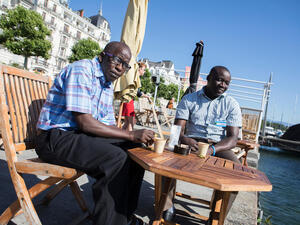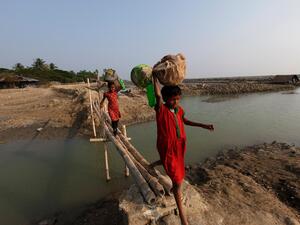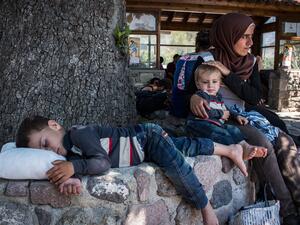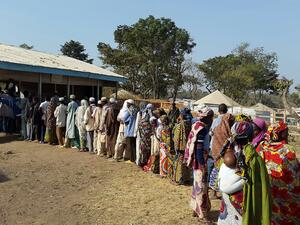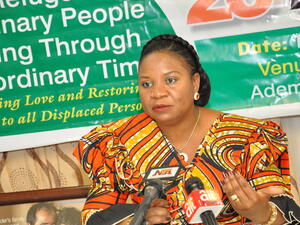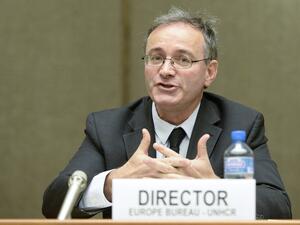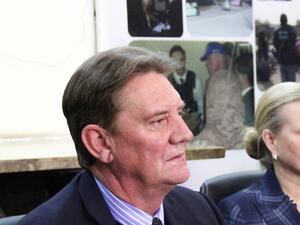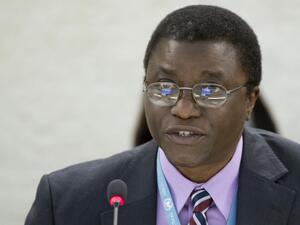Q&A: Drawing the curtain down on West Africa's last big repatriation operation
Q&A: Drawing the curtain down on West Africa's last big repatriation operation

Michel Gaudé, head of UNHCR's West Africa desk.
GENEVA, June 15 (UNHCR) - At the end of the month, UNHCR completes its assisted repatriation programme for Liberian refugees. But Michel Gaudé, head of the agency's West Africa desk, says UNHCR will remain in Liberia for at least 18 more months to support the reintegration of returnees. Gaudé, who started his UNHCR career 27 years ago in Rwanda, told Senior Public Information Officer Andrej Mahecic that he was cautiously optimistic about the outlook for his region. Excerpts from the interview:
How successful has the Liberia operation been?
A few days ago, we topped the 100,000 mark for the number of Liberians who have returned home under UNHCR auspices. We hope that by the end of the month maybe another 5,000-10,000 people will decide to return.... It is difficult to predict the ultimate figures.
I think this operation has been a success.... The regional synergy worked very well. There was very good communication and very good interaction between all the countries involved. The coordination mechanisms were put in place from Monrovia, but the interaction with all stakeholders went very well from the early stages of repatriation. Even before the repatriation started, great efforts were put into coordination at the field level and it worked very well.
The same [good coordination] happened between agencies. The coordination was quite good, particularly with WFP (World Food Programme), with the involved governments and with other agencies such as GTZ - they played a key role in this repatriation operation - and of course all our NGO partners without whom we would not be able to reach this achievement.
What were the major challenges to the operation?
Major problems we faced included the weather and the rough terrain. The rainy season, which lasts about six months of the year, caused major problems when it came to getting access to areas of return in Liberia. It was a reason that many refugees gave for not returning. Poor road conditions exacted a heavy and costly toll on vehicles.
There were logistical problems. The distances were huge for many refugees. I'm thinking particularly of the Liberian refugees in Nigeria or in Ghana. Organizing transport for their return has been a major challenge for us ... bringing people back by air is extremely costly and does not allow people to bring all their belongings. Chartering ships was also a big problem due to the unavailability of passenger vessels.
Another challenge was that the Liberian refugees had generally been received well in countries of asylum. They were offered good living conditions, in some cases with free access to land or employment. Many Liberians did not want to give up their relatively comfortable life for an uncertain future. Leaving a camp with facilities such as schools and health clinics and taking the decision to return to places where almost everything has been destroyed was definitely an issue.
There was another constraint specific to this operation. In the past, many Liberian refugees were resettled in third countries under UNHCR auspices, but this stopped when the repatriation operation started. Many Liberians continue to hold out the dream of resettlement, but for UNHCR this is no longer an option.
Does UNHCR's role end once the repatriation deadline is reached?
UNHCR in the last three years has played a key role in the reconstruction and rehabilitation of the country. We have no intention to leave Liberia prematurely. The repatriation programme ends this month, but we will continue working on reintegration projects until the end of 2008. This will include continuous advocacy to bring more development actors to Liberia and help consolidate the peace process.
We will continue. We will not abandon Liberia; we will not abandon the returnees who trusted us in the repatriation process. We will still have an important presence throughout the country and will consolidate the reintegration efforts that we have made so far.
UNHCR's Sierra Leone operation wrapped up in 2004. Is this the dawn of a lasting peace and the end of large-scale displacements in West Africa?
Until 1989, West Africa was seen as peaceful, with small crises here and there but no major displacements of population from one country to another.... The first conflict - and the biggest - started in Liberia in December 1989. There was also the Mauritania-Senegal crisis in April 1989. The Mali-Niger crisis generated a lot of population displacement. The Sierra Leonean civil war started soon after Liberia's conflict, while waves of refugees came from Togo in 1992-1993 and more recently in 2005.
But enormous energy has been expended to secure peace and reconciliation in the entire West Africa region and this has been indispensable in bringing peace.... There is still a lot to do and there are a lot risks, but we are seeing a strong determination among the countries of West Africa to prevent future eruptions of conflict. I'm confident that we are entering into a new, more stable and more peaceful era.
Should we be giving refugees more time to return home?
I don't think we are rushing to complete this operation, which started in October 2004. People are free to return, regardless of our assistance - it is their will which is the prevailing factor and nobody will be forced by UNHCR to return back home. The massive return of Liberian refugees means that our assistance was - and is - an adequate response. I also strongly believe people are needed back home to build peace, stability and prosperity. Returning refugees must be involved in reconstruction efforts - and by that I mean physical reconstruction as well as building the spirit of peace and the dynamics of development and stability.
What about the Liberian refugees who are not returning?
It is easy to understand why many Liberians may not be excited at the prospect of returning to a country which is totally unknown to the younger generation. Many want to stay where they are and UNHCR is working with host countries and the refugees themselves to look at the local integration option. We are looking at all legal, practical and financial aspects for the local integration of about 50,000 Liberians.
We have noticed over the past 20 years that West African countries hosting refugees have a generally positive attitude. We do not anticipate any major problems in making local integration another success.... Some governments have even offered refugees easy access to citizenship, which is a clear demonstration of their interest in finding durable solutions for refugees who want to stay.
Where else in the region does UNHCR have operations?
There is the Togolese repatriation operation. We signed tripartite agreements in April with host countries Ghana and Benin as well as with Togo. Togolese refugees in Ghana and Benin have shown a clear desire to return home with UNHCR assistance. The repatriation has started and ... will accelerate in the coming weeks.
We are optimistic that Mauritanian refugees in Senegal and Mali will soon be able to return home. The government of Mauritania has indicated willingness to bring this situation to an end within the next 12 months and we are ready to cooperate.
Côte d'Ivoire has been on our radar screens for the past five years.... We are much more optimistic about the return of durable peace in Côte d'Ivoire.... There are some 12,000-13,000 refugees in neighbouring countries. But there is a bigger challenge inside Côte d'Ivoire with hundreds of thousands of internally displaced people. We are optimistic that in the coming months we'll be able to offer them the possibility to return home safely.
Will UNHCR be reducing its footprint in West Africa?
In some countries where the level of operations has been significantly reduced, we have already established smaller offices.... We will leave an important presence in Nigeria. We will keep a significant presence in Liberia until 2009. In Guinea and Sierra Leone, the scaling down has already started and will continue until 2009. The same applies to Benin. In Ghana and Côte d'Ivoire, our presence will be required for a longer period.
We believe that Dakar in Senegal is the best location to re-establish a regional office ... many of our closest partners have their regional presence in Dakar and many others have regional structures or directorates in Dakar. We need to work with these and other partners as a team and Dakar appears to be the best place to facilitate this coordination.


